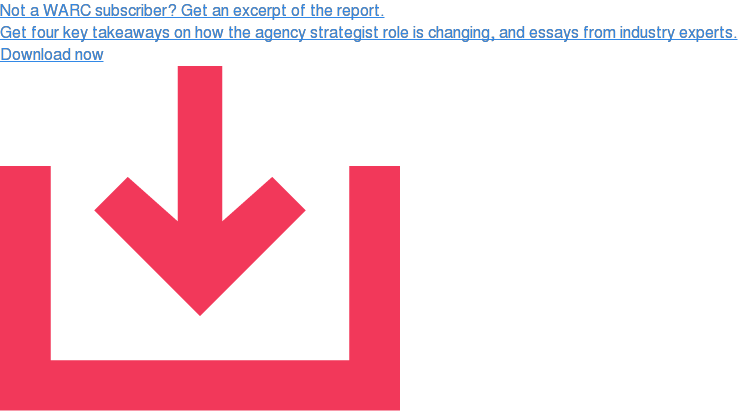What could be more planner-like than holding a chunky survey and feeling a creeping sense of doubt, asks Tom Morton?
The good news from WARC’s Future of Strategy survey is that planning is becoming a more important part of agency life: a bigger influence in two-thirds of agencies, and a bigger department in half of agencies.
And then comes the doubt. We hold this bigger position, now what are we going to make of it? How are we going to parley our increasing presence in agencies into an increasing influence on their creative output? Are the creatives even listening to us?
I’m enough of a nerd about this that I interviewed a hundred planning and creative directors before last year’s Cannes Lions to understand how the two disciplines could work better together.
Planners certainly see the issue in terms of relationships: they tend to think their influence should come from their friendship with creatives. They talk about getting to know their colleagues as people, kicking ideas around, and going for a beer together.
Even if the planners are buying, creative aren’t drinking. Because, while planners want to be friends, creatives want to be inspired. Their biggest ask from planners is insights. When I asked creative directors what they most wanted from their planners, they spoke about telling me something I never knew before about the brand or the audience, giving a unique take on the brand, bringing facts and research into human behaviour. In other words: insight.
This runs counter to how planners spend much of their time, wrangling decks and hauling their thinking around internal and client organisations. It also runs counter to how planning has evolved since its early days, from finding juicy truths about grocery brands and their buyers, to guiding products and services through new media landscapes and shifting consumer expectations.
But it turns out that insight remains the most valuable commodity.
Planners tend to assume that creatives want well-articulated problem statements. They don’t. They want new truths to work with. They want insight-hunters, not provocateurs.
I see this in my own agency, R/GA. There’s an urban myth about the misguided planner, gifted with a Nike project, who started penning a (provocative) think-piece about how mankind’s desire to run springs from our origins in the Rift Valley, or how cricket is a product of colonialisation and the spread of the railways. The smart ones dig for sharp new truths – what college athletes really worry about before back to school season, or why Kyrie Irving moves differently on the court. The insight hunters beat the provocateurs every time.
As agency output broadens into more systematic areas like design, innovation, and interface, creatives need human truths to build and design around. My CCO Chloe Gottlieb was emphatic here, when she said: “If you give a good creative a truth to work with, we can build anything.” It’s no coincidence that UX centres on the hunt for use cases, pain points, and unmet needs: human truth helps everyone understand how best to use technology to make a difference in the real world.
This recasts the value of a good planner. If insights are fresh truths, then we should always be searching for new ones, before our old ones go stale. We could be social listening, Instagram stalking, observing people in ethnographic projects, or combing company data for hidden patterns, so long as we are out there. The emerging behaviour that we find is our most useful contribution to breakthrough output.
And if we set out to be useful, we’ll end up being as important as we claim to be in the survey.
This commentary appears in WARC’s new Future of Strategy report, based on a global survey of senior agency planners. The report covers the current state of the strategic discipline, future opportunities and challenges, and guidance on building the planning team of the future.


